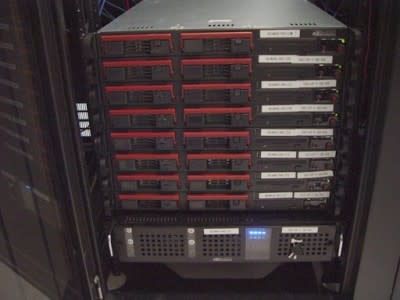Cloud computing is the plot twist in the Aereo TV case
The Supreme Court heard arguments Tuesday in the highly touted Aereo live streaming TV case, but it looks like the decision’s possible chilling effect on cloud computing could complicate any ruling from the Justices.
The day started off with a historic decision on affirmative action, followed by the Aereo arguments and another high-profile case about political free speech.
The case of American Broadcasting Companies, Inc. vs. Aereo, Inc. has been marked on the calendar of court watchers for months. Lines started forming Monday night to attend the arguments.
The highly publicized case involves a copyright battle between Aereo, a tech TV startup, and the major television networks that could affect the future of broadcast television.
Aereo is a company that provides a paid service used by people with computers, and it allows customers to watch broadcast TV programs on a computer that are also available for free over the airwaves.
The TV networks are deeply upset that Aereo can resell their broadcast TV signals without permission or compensation, and fear the precedent will erode their revenue models, which depend on retransmission fees and contracts with sports organizations.
But as the case headed to Tuesday’s arguments, a late-developing plot twist complicated what appeared to be a copyright battle.
In March, Aereo’s lawyers more aggressively injected the idea into the debate that a ruling against it would also set a precedent that could shut down the huge cloud computing industry, where digital content is stored remotely and retrieved by computer users.
Soon, companies like Mozilla filed briefs supporting Aereo in the case. Mozilla argued that tests proposed by Aereo’s opponents to eliminate Aereo while leaving the cloud computing industry intact were “unworkable,” and “would endanger the thriving cloud computing industry just as it starts to mature.”
Paul Clement, the noted attorney representing the TV networks, countered that argument in front of the Justices, only to be on the receiving end of more questions from the Court.
“Are we somehow catching other things that would really change life and shouldn’t?” asked Justice Stephen Breyer, who said the prospect of harming the cloud computing industry made him nervous.
David Frederick, another noted attorney representing Aereo, argued that the “cloud computing industry is freaked out about the case” because a decision against Aereo would bring copyright law into play any time music or an image is retrieved from the cloud.
Chief Justice John Roberts did pin down Frederick on Aereo’s business model as a convenient way around paying fees to broadcasters.
“Your technological model,” Roberts told Frederick, “is based solely on circumventing legal prohibitions that you don’t want to comply with.”
However, observers in the courtroom seemed aware that the Justices were focusing on the cloud computing issue.
“The Justices seemed keenly aware that their ruling would have vast implications for the broadcast industry and for technical innovations involving cloud computing,” said the New York Times’ Adam Liptak.
“Before Wednesday’s argument, most legal experts were convinced the justices would rule against Aereo’s service as a violation of copyright laws. But that certainty faded during the hour-long argument. Several justices admitted they were struggling for the right answer,” said David Savage from the Los Angeles Times
“Justices Stephen Breyer, Sonia Sotomayor and others said a ruling against Aereo, which is a cloud-based service, threatened to harm more established cloud-computing services, such as Apple Inc.’s iCloud. Justice Breyer said the broadcasters’ arguments made him “nervous,” while Justice Sotomayor said the case was a difficult one,” said The Wall Street Journal’s Brent Kendall.
The website Re/Code, run by former Wall Street Journal editors Kara Swisher and Walt Mossberg, summed up the Justice’s predicament.
“’How do we get out of this,’ and write a decision that allows cloud-computing companies to keep operating, Breyer asked Eric Feigin, a lawyer with the Department of Justice, which has sided with the TV networks in this case,” posited Peter Kafka and Amy Schatz.
For now, the Justices will discuss the case privately and a ruling is expected in late June. Speculation about Aereo’s fate as a business and cloud computing in general probably won’t fade away before then.
Recent Constitution Daily Stories
Constitution Check: If the President signs a bill into law, must he obey it?
Supreme Court case today channels Colbert among others
Supreme Court still considering New Jersey gun-permit rights case

